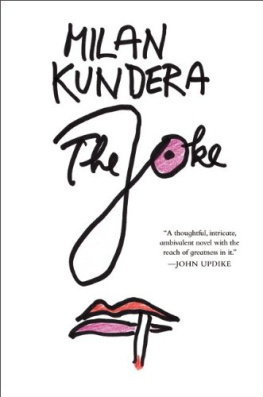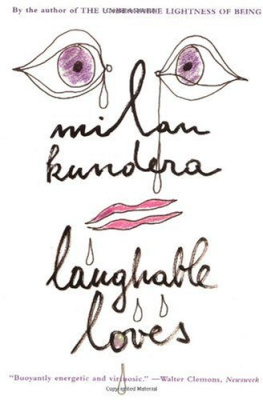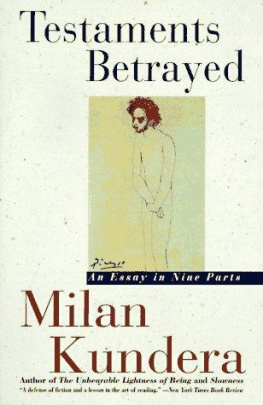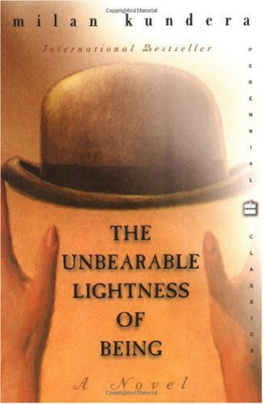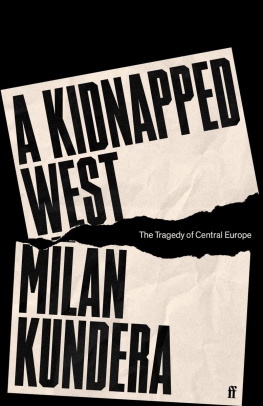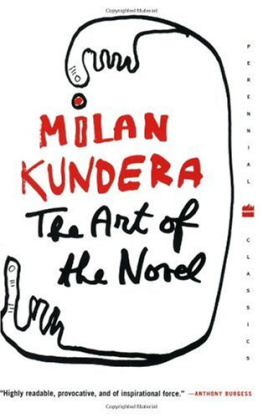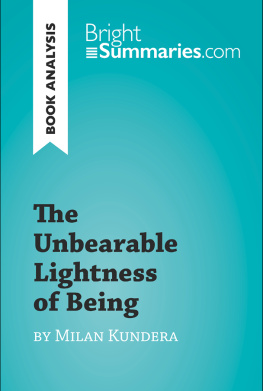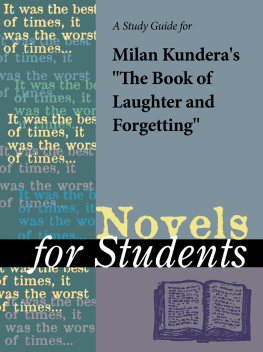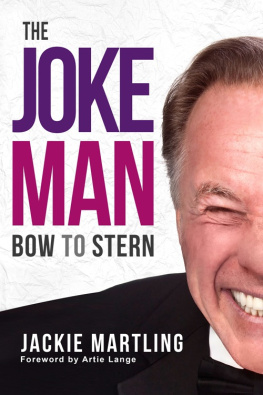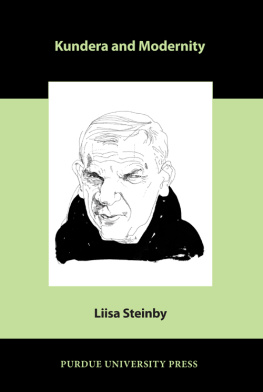
Milan Kundera
The Joke
DEFINITIVE VERSION FULLY REVISED BY THE AUTHOR
ISBN 0-06-099505-X
Originally published in Czechoslovakia by Ceskoslovensky Spisovatel, 1967 under the title Zert.
This English Translation copyright 1982, 1992 by HarperCollins
Contents
Author's Note vii
PART ONE Ludvik 1
PART TWO Helena 13
PART THREE Ludvik 27
PART FOUR Jaroslav 119
PART FIVE Ludvik 161
PART SIX Kostka 205 PART SEVEN Ludvik, Jaroslav, Helena 247
AUTHOR'S NOTE
If it didn't concern me, it would certainly make me laugh: this is thefifth English-language version of The Joke.
The first version was published in London in 1969 by Macdonald, in a translation by David Hamblyn and Oliver Stallybrass. I remember my amazement when I received the book in Prague; I didn't recognize it at all: the novel was entirely reconstructed; divided into a different number of parts, with chapters shortened or simply omitted. (An odd comparison: between December 1965 and early 1967 the original Czech manuscript was kept from publication in Prague by Communist censorship; I had rejected all the changes they wanted to impose on me, and the novel was finally allowed to appear in April 1967
exactly as I had written it.)
Living in a country occupied by the Russian army, deprived of my passport and so without any possibility of leaving, I found it very difficult to defend myself. I succeeded, nevertheless, in publishing a letter of protest in the Times Literary Supplement and even in bringing about the publication in Britain of a revised, complete version, that is, without deletions and with the chapters in their original sequence (Penguin Books, 1970). My satisfaction with this turned out to be only relative: a glance through the book showed me that the translation was still very free; for example, an obviously important matter of punctuation: Helena's monologue, comprising all of Part Two, in which each paragraph is one long "infinite" sentence in my original, had been broken up into many very short sentences. I decided to close the book and to know no more of it.
That Penguin version was actually the third. The second had been published by Coward-McCann in New York a year earlier, not long after the first British edition. It was based on the Hamblyn-Stallybrass translation; in this version the original sequence of parts was respected, but the entire text was systematically curtailed; one need only look at the first two paragraphs: in the complete version of 1970 they consist of twenty-seven lines, in the Coward-McCann edition there are only fifteen. This time all my telegrams of protest from Prague went unanswered. The American publisher was ready to show his sympathy for censored authors in Communist countries, but only on the condition that they submit to his own commercial censorship.
One day I heard that a young American professor of Slavic studies, Michael Henry Heim, had published in a specialized journal a translation of two of the passages that had been deleted from The Joke. I was deeply touched by this noble gesture of solidarity with mistreated, humiliated literature. When Knopf, my publisher at the time, refused for reasons obscure to me to work with the translator of my two previous books (who had all my confidence), the translation of my next novel, The Book of Laughter and Forgetting (1980), was assigned to Heim. And soon after that, when my new editor, Aaron Asher at Harper & Row, proposed (a dozen years after the first three mutilated versions) that The Joke finally appear in a faithful as well as unabridged English-language version, he too approached Heim.
At Aaron's request, I wrote a preface for that new edition of The Joke: there I recounted this novel's eventful history in Czechoslovakia and in France, evoked the sad tale of its three earlier English-language versions, and added two paragraphs to convey my exacting concept of the novel and also serve as a message to my new translator:
"When Goethe was working on Wilhelm Meister, he allowed his secretary Riemer to read proof for him and strike out a superfluous
word or touch up a phrase here or there, though he would never have entrusted his poetry to him. In Goethe's time prose could not make the aesthetic claims of poetry; perhaps not until the work of Flaubert did prose lose the stigma of aesthetic inferiority. Ever since Madame Bo-vary, the art of the novel has been considered equal to the art of poetry, and the novelist (any novelist worthy of the name) endows every word of his prose with the uniqueness of the word in a poem.
"Once prose makes such a claim, the translation of a novel becomes a true art. A novelist whose works are banned in his own country is doubly conscious of the difficulties involved."
When I was sent the manuscript of the new translation, I barely read it; I had a priori confidence in a translator whom I knew as a defender of my novel and thought I could spare myself the laborious job of checking the text in detail. And so in 1982 the fourth English-language version of The Joke appeared, first from Harper & Row, then (with identical text) in paperback from Penguin (U.S.) with the words "in a new brilliant translation" on the cover and from King Penguin (U.K.) with "now in the new authorised translation." These words corresponded to what I myself had written in the preface: "now the same professor of literature who ten years ago published the material omitted from the English edition has done the first valid and authentic version of a book that tells of rape and has itself so often been violated."
Nevertheless, I have long been accustomed carefully to review, in manuscript, the translations of my novels, particularly the French but also the Italian, German, and English. I didn't abandon this principle when it came to The Unbearable Lightness of Being, on the English-language version of which I spent a great deal of time. When in the autumn of 1990 Aaron proposed the republication of The Joke at HarperCollins, I responded, gripped by suspicion: "Yes, of course, but first I want to reread the translation, this time with care."
And so I did. In the beginning there was nothing seriously wrong, and Part Two,
"Helena," was quite good, but from the start of Part Three, I had the increasingly strong impression that what I read was not my text: often the words were remote from what I had written; the syntax differed too; there was inaccuracy in all the reflective passages; irony had been transformed into satire; unusual turns of phrase had been obliterated; the distinctive voices of the characters-narrators had been altered to the extent of altering their personalities (thus Ludvik, that thoughtful, melancholy intellectual, became vulgar and cynical). I was all the more unhappy because I did not believe that it was a matter of incompetence on the translator's part, or of carelessness or ill will: no; in good conscience he produced the kind of translation that one might call translation-adaptation (adaptation to the taste of the time and of the country for which it is intended, to the taste, in the final analysis, of the translator). Is this the current, normal practice? It's possible. But unacceptable. Unacceptable to me.
In The Art of the Novel, I repeatedly explain my attitude regarding translation and even assert: "I once left a publisher for the sole reason that he tried to change my semicolons to periods." Knowing my attitude, readers should have had no reason to doubt the total fidelity of the fourth English-language version of The Joke, which I had so warmly approved in my preface. And so I considered myself guilty of having deceived them and notified Aaron that he might have a difficult time ahead of him.
Next page
